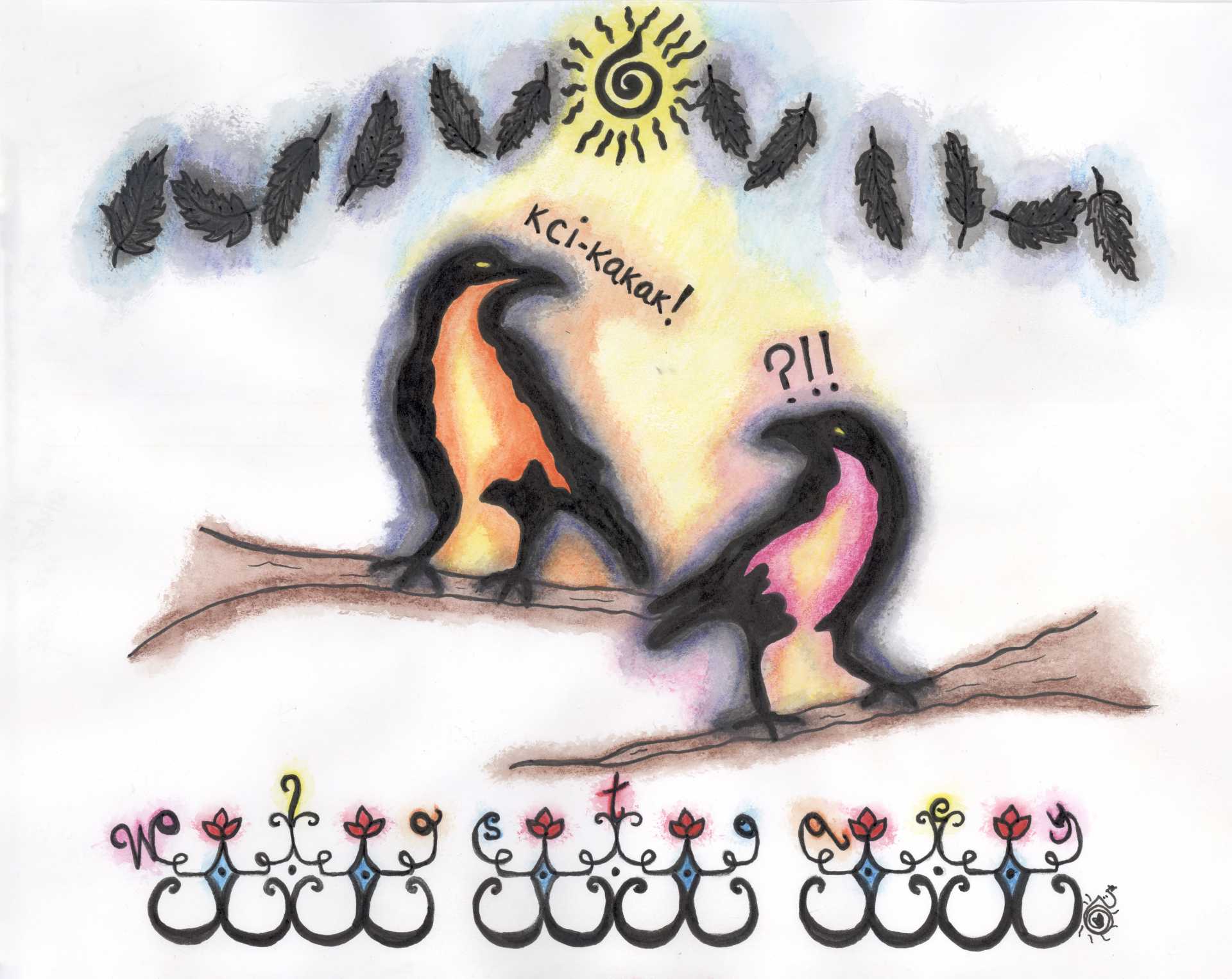


Raven is one of the only birds in North America to be able to practise the art of conversation. His strength? His liveliness which pushes him to practise again and again until he manages to master a word, then two, then three ... Raven also has the magic power of being able to plunge into the darkness of the past to bring back the light. In particular, bring back the light of traditional languages so that they are not forgotten in the past.
Home / Module 10 / Speak your Indigenous language


Wolastoqey eleyimok nihtol wisokelkil elitahatasik neqtakutomuweyal kisapektekil (elakutultimok) wiciw,

Wolastoqey culture refers to a broad concept of kinship which includes, in addition to the human family,
ankuwiw pomawsuwinuwey neqtakutomucik, toleyak ‘qotkomiksuwok, piluweyak qihiw skicinuwok naka ‘cel peciw weyossisok,

clan members, other neighbouring nations and even animals, plants and elements of the territory
kihkasikil naka psi keq piluwey ktahkomiqok elitahamut neqtakutomucik naka cuwi kcitomitahatasu.

which are considered members of our family and deserve all of our respect.
 ⎙
⎙
| Qui sommes-nous? | Who are we? | |||||
|---|---|---|---|---|---|---|
| Eli skicinuwi naka wolastoqewi | Je suis autochtone et wolastoqey (malécite). | I am Indigenous and Wolastoqey (Maliseet). |

|
| Quelques mots-clés | A few keywords |


| ||||
|---|---|---|---|---|---|---|
| Wolastoq | La belle et généreuse rivière. | Beautiful and bountiful river. |

|
|||
| Wolastoqiyik | Le peuple de la belle et généreuse rivière. | People of the beautiful and bountiful river. |

|
|||
| Wolastokuk | Notre territoire ancestral. | Our homeland. |

|
|||
| Waponahkiyik | Gens de la confédération Wabanaki. | People of the Wabanaki confederacy. |

|
|||
| Aha | Oui | Yes |

|
|||
| Ontama | Non | No |

|
| Se présenter | How to introduce yourself |


| ||||
|---|---|---|---|---|---|---|
| Keq kil ktoliwis? | Quel est ton nom? | What is your name? |

|
|||
| Ntoliwis nil … | Mon nom est … | My name is … |

|
|||
| Tama kil 'kuceyaw? | D’où viens-tu? | Where are you from? |

|
|||
| Nuceyaw nil … | Je viens de … | I come from … |

|
| Prendre contact | Making contact |


| ||||
|---|---|---|---|---|---|---|
| Tan kahk olu kil? | Comment vas-tu? | How are you? |

|
|||
| Mec-ote pesqon. | Je vais bien. | I’m fine. |

|
|||
| Kil olu tan? | Et toi? | What about you? |

|
| Toutes mes relations – Famille humaine | All of my relations – Human family |


| ||||
|---|---|---|---|---|---|---|
| Nikuwoss | Ma mère | My mother |

|
|||
| Nmihtaqs | Mon père | My father |

|
|||
| Nuhkumoss | Ma grand-mère | My grandmother |

|
|||
| Nmuhsums | Mon grand-père | My grandfather |

|
|||
| Nhesis | Mon grand frère | My older brother |

|
|||
| Nmossis | Ma grande sœur | My older sister |

|
|||
| Nuhsimis (ok) | Frère(s) ou sœur(s) plus jeune(s) | Younger sibling(s) |

|
|||
| Nitap | Ami masculin | Male friend |

|
|||
| Nitapesq | Amie féminine | Female friend |

|
| Toutes mes relations – Animaux | All of my relations – Animals |


| ||||
|---|---|---|---|---|---|---|
| Ntemis | Mon chien | My dog |

|
|||
| Nposum | Mon chat | My cat |

|
|||
| Otuhk | Cerf | Deer |

|
|||
| Malsom | Loup | Wolf |

|
|||
| Pili-malsom | Coyote | Coyote |

|
|||
| Kci-kakak | Corbeau | Raven |

|
|||
| Kahkakuhs | Corneille | Crow |

|
|||
| Cihpolakon | Aigle | Eagle |

|
|||
| Cihkonaqc | Tortue | Turtle |

|
|||
| Kiwhos | Rat musqué | Muskrat |

|
|||
| Muwin | Ours | Bear |

|
|||
| Polam | Saumon | Salmon |

|
| Toutes mes relations – Arbres et végétaux | All of my relations – Trees and plants |


| ||||
|---|---|---|---|---|---|---|
| Kakskusimus | Cèdre | Cedar |

|
|||
| Kuwes | Pin | Pine |

|
|||
| Welimahaskil | Foin d’odeur | Sweetgass |

|
|||
| Masqemus | Bouleau | Birch |

|
|||
| Akomahq / Wikp | Frêne blanc / Frêne noir | White ash / Black ash |

|
|||
| Kiwhosuwasq | Acore odorant (racine du rat musqué) | Acorus calamus (muskrat root) |

|
|||
| Pskihqimins | Fraise | Strawberry |

|
|||
| Minsoss | Framboise | Raspberry |

|
|||
| Saht | Bleuet | Blueberry |

|
| Toutes mes relations – Environnement naturel | All of my relations – Natural environment |


| ||||
|---|---|---|---|---|---|---|
| Supeq | Océan | Ocean |

|
|||
| Sip | Rivière | River |

|
|||
| Kuspem | Lac | Lake |

|
|||
| Woc | Montagne | Mountain |

|
|||
| Tolamson / Wocawson | Il vente. | It’s windy. |

|
|||
| Wast | Neige (au sol) | Fallen snow |

|
|||
| Samaqan | Eau | Water |

|
|||
| Kisuhs | Soleil | Sun |

|
|||
| Skitkomiq | Terre | Earth |

|
| Compter | Counting |


| ||||
|---|---|---|---|---|---|---|
| Pesq | Un | One |

|
|||
| Nis | Deux | Two |

|
|||
| Nihi | Trois | Three |

|
|||
| New | Quatre | Four |

|
|||
| Nan | Cinq | Five |

|
| Dire ce que je vois ou ce que j’entends | To describe what I see or hear |


| ||||
|---|---|---|---|---|---|---|
| Nomiya nil … | Je vois … | I see … |

|
|||
| Nomiya nil pesquhs mus. | Je vois un orignal. | I see a moose. |

|
|||
| Knomiya kil? | Le vois-tu? | Do you see it? |

|
|||
| Nutuwa nil … | J’entends … | I hear … |

|
|||
| Nutuwa nil pili-malsom. | J’entends le coyote. | I hear a coyote. |

|
|||
| Knutuwa kil? | L’entends-tu? | Do you hear it? |

|
| Le temps qui passe | The passage of time |


| ||||
|---|---|---|---|---|---|---|
| Sepawiw | Matin | Morning |

|
|||
| Woli-sepawiw | Bon matin! | Good morning! |

|
|||
| Pasqe | Midi | Noon |

|
|||
| Kisi-pasqe | Après-midi | Afternoon |

|
|||
| Woli kisi-pasqe | Bon après-midi! | Good afternoon! |

|
|||
| Nipayiw | Nuit | Night |

|
|||
| Woli-nipayiw | Bonne nuit! | Good night! |

|
| Jours de la semaine | Days of the week |


| ||||
|---|---|---|---|---|---|---|
| Pemkiskahk | Aujourd’hui | Today |

|
|||
| Sepawonuk | Demain | Tomorrow |

|
|||
| Wolaku | Hier | Yesterday |

|
|||
| Sonte | Dimanche | Sunday |

|
|||
| Kissonte | Lundi | Monday |

|
|||
| Nis-luhkan | Mardi | Tuesday |

|
|||
| Nihi-luhkan | Mercredi | Wednesday |

|
|||
| New-luhkan | Jeudi | Thursday |

|
|||
| Skehewahtoq | Vendredi | Friday |

|
|||
| Kotuwahsonte | Samedi | Saturday |

|
| Émotions | Emotions |


| ||||
|---|---|---|---|---|---|---|
| Tan ktolomolsin? | Comment te sens-tu? | How do you feel? |

|
|||
| Nulitahas. | Je suis heureux (heureuse). | I’m happy. |

|
|||
| Npalitahams. | Je suis fier (fière). | I’m proud. |

|
|||
| Nkospon. | Je suis fatigué (fatiguée). | I’m tired. |

|
|||
| Tanokal. | Je ne suis pas certain (certaine). | I’m not sure. |

|
|||
| Ma-te kulomolsiw? | Tu ne vas pas bien? | You don't feel well? |

|
| Quatre couleurs sacrées | 4 sacred colours |


| ||||
|---|---|---|---|---|---|---|
| Wapi | Blanc | White |

|
|||
| Mokosewi | Noir | Black |

|
|||
| Wisawi | Jaune | Yellow |

|
|||
| Mehqi | Rouge | Red |

|
| Prière de gratitude | Prayer of thankfulness |


| ||||
|---|---|---|---|---|---|---|
| Woliwon psi-te keq. | Merci pour tout. | Thanks for everything. |

|
|||
| Woliwon Kci-niwesq naka Kci-montu. | Merci au Grand-Mystère (force féminine) et au Grand-Esprit (force masculine). | Thanks to the great mystery (female principle) and the great spirit (male principle). |

|
|||
| Woliwon kisiyulinoq. | Merci au Créateur. | Thanks to the creator. |

|
|||
| Woliwon skitkomiq. | Merci à la Terre-Mère. | Thanks to mother earth. |

|
|||
| Woliwon kisuhs naka nipawset. | Merci au soleil et à la lune. | Thanks to the sun and the earth. |

|
| Mecimi-te qeci skicinuwatu. Ktolonapemok knutakuk! | Parlez votre langue ancestrale autant que vous le pouvez. Vos ancêtres vous entendent! | Speak your ancestral language as much as you can. Your ancestors can hear you! |


| |||
|---|---|---|---|---|---|---|